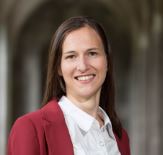ECDN Spring Event 2024
“Planting the Seeds for Impact”
The IAM Early Career Development Network (ECDN) aims to provide IAM members with a range of professional and career development activities across the key strands of academic posts. FASTIR careers combine different foci of Funding-Academic-Service-Teaching-Impact-Research.
This IAM ECDN event focused on Impact: what is it now and in the future? How to plan, develop and present Impact and challenges and opportunities facing early career scholars. This event combined plenary talks from leading Irish scholars with discussions about Impact with peers, senior colleagues and Research Officers offering a supportive and developmental environment. Attendees had the opportunity to take time out to reflect on how they achieve Impact and the role of Impact in their own career goals and plans. This event also provided an opportunity for informal networking between ECDN IAM members.
ECDN Spring Event Schedule
This is an online event on Thursday, 14th March from 09:30am – 12pm. Attendance is free for IAM members and all staff and students of an institutional member.
The event starts at 9.30am
- Welcome Address
- Introducing FASTIR Careers
- Back to basics in publishing: From ABS to FWCI and everything in between
- Think – Team – Share Discussion
- Publishing and Your PhD
- Plenary talk “My Research Journey” Dr Lisa van der Werff
- Audience Q&A
- Lunch and informal networking
Speaker’s Bio
 Esther Tippmann is Professor of Strategy and serves as Head of Discipline, Management and Co-Director of the Centre for Entrepreneurial Growth and Scaling (CEGS).
Esther Tippmann is Professor of Strategy and serves as Head of Discipline, Management and Co-Director of the Centre for Entrepreneurial Growth and Scaling (CEGS).
Esther’s research concerns the international strategies of organizations, esp. globally scaling and digital businesses. Her work also concerns the enhancement of the strategic contribution of subsidiaries to multinationals. She has worked closely with several scaling firms and multinational corporations in Ireland, France, U.K. and the U.S. on case studies and research projects. She has been published in the Strategic Management Journal, Journal of International Business Studies, Organization Studies, Journal of World Business, Journal of Management Studies, Global Strategy Journal, Harvard Business Review and Sloan Management Review, among others. Her research received several honours, including awards and nominations from the Academy of Management, Academy of International Business, and Strategic Management Society. Esther currently serves as Senior Editor for the Journal of World Business, on the editorial boards of the Journal of International Business Studies and Long Range Planning, and as Chair for the Global Strategy Interest Group at the Strategic Management Society.
Esther is also passionate about teaching and strives to enable students and executives to critically evaluate how decisions influence long-term organizational success in a global context and impact society. She has taught in the areas of Strategic Management, Global Strategy, International Business, and Qualitative Research across all levels, including executives, in Austria, Ireland, Germany, and France.
Before joining the University of Galway, Esther was a faculty member at University College Dublin and Research Fellow at Grenoble Ecole de Management, France. She held a Marie-Curie Fellowship, funded by the European Commission and Irish Research Council, and was a Visiting Professor at WU Vienna.
Steering Group Members
 Claire is chair of the ECDN Steering Group. A Professor of Organisational Behaviour & HRM. Claire is the Director of the DCU Graduate Certificate in Strategic Leadership programme for Teagasc. Previously Claire was a Fulbright Scholar at Carnegie Mellon University and visiting Professor in Princess Nourah Bint Abdulrahman University in Riyadh. She is published in Human Resource Management (US), Organization Studies, Journal of Management Inquiry, Human Resource Management Journal, Human Resource Development Quarterly, Advances in Developing Human Resources, Human Resource Development Review and Journal of European Industrial Training and she is co-author of two books. Claire’s research interests centre around the domain of social relationships, relationship and network dynamics and effects including learning. She has over 20 years experience consulting with industry nationally and internationally. She serves on the council of the Irish Institute of Training & Development (IITD) and the Irish Academy of Management (IAM) and is a Fellow of the Centre for Evidence Based Management (CEBMa).
Claire is chair of the ECDN Steering Group. A Professor of Organisational Behaviour & HRM. Claire is the Director of the DCU Graduate Certificate in Strategic Leadership programme for Teagasc. Previously Claire was a Fulbright Scholar at Carnegie Mellon University and visiting Professor in Princess Nourah Bint Abdulrahman University in Riyadh. She is published in Human Resource Management (US), Organization Studies, Journal of Management Inquiry, Human Resource Management Journal, Human Resource Development Quarterly, Advances in Developing Human Resources, Human Resource Development Review and Journal of European Industrial Training and she is co-author of two books. Claire’s research interests centre around the domain of social relationships, relationship and network dynamics and effects including learning. She has over 20 years experience consulting with industry nationally and internationally. She serves on the council of the Irish Institute of Training & Development (IITD) and the Irish Academy of Management (IAM) and is a Fellow of the Centre for Evidence Based Management (CEBMa).
 Anne is Full Professor of Human Resource Management (HRM) at University College Dublin, College of Business (Ireland). She previously worked at Rotterdam School of Management, Eramsus University Rotterdam and Amsterdam Business School, University of Amsterdam. Her primary research interests are HRM in online labor platforms, gig work and project-based organizations and her recent work draws on paradox theory and institutional theory. Her work is published in Human Resource Management Journal, Human Resource Management, International Journal of Human Resource Management, Journal of Management Studies, Organization Studies, Journal of Applied Psychology, and International Journal of Project Management where she is former Associate Editor for HRM and OB and currently sits on the Strategic Advisory Board. She has contributed to scholarly handbooks including Oxford Handbook of Organizational Paradox, Cambridge Handbook of Organizational Project Management, and the Elgar Introduction to Theories of Human Resources and Employment Relations.
Anne is Full Professor of Human Resource Management (HRM) at University College Dublin, College of Business (Ireland). She previously worked at Rotterdam School of Management, Eramsus University Rotterdam and Amsterdam Business School, University of Amsterdam. Her primary research interests are HRM in online labor platforms, gig work and project-based organizations and her recent work draws on paradox theory and institutional theory. Her work is published in Human Resource Management Journal, Human Resource Management, International Journal of Human Resource Management, Journal of Management Studies, Organization Studies, Journal of Applied Psychology, and International Journal of Project Management where she is former Associate Editor for HRM and OB and currently sits on the Strategic Advisory Board. She has contributed to scholarly handbooks including Oxford Handbook of Organizational Paradox, Cambridge Handbook of Organizational Project Management, and the Elgar Introduction to Theories of Human Resources and Employment Relations.
 James is an Assistant Professor of Management and Organisational Behaviour at the School of Business, Maynooth University, Ireland. With a background in new media and technology, James’ research examines the automation of management practice, digitalisation at work, and the role of human resource management in the future workplace. Prior to joining Maynooth University, James completed his doctoral studies at Cork University Business School, University College Cork, Ireland, where his thesis explored the role of algorithmic management in shaping the experiences of app-based gig workers. A previous Irish Research Council scholarship awardee, James’ research has been published in outlets such as Human Resource Management Journal and the International Journal of Human Resource Management.
James is an Assistant Professor of Management and Organisational Behaviour at the School of Business, Maynooth University, Ireland. With a background in new media and technology, James’ research examines the automation of management practice, digitalisation at work, and the role of human resource management in the future workplace. Prior to joining Maynooth University, James completed his doctoral studies at Cork University Business School, University College Cork, Ireland, where his thesis explored the role of algorithmic management in shaping the experiences of app-based gig workers. A previous Irish Research Council scholarship awardee, James’ research has been published in outlets such as Human Resource Management Journal and the International Journal of Human Resource Management.
 Jonathan is a Senior Lecturer at the Department of Work and Employment Studies, Kemmy Business School, University of Limerick. He is a former IRCHSS Post-doctoral fellow, IRCHSS Government of Ireland Scholar and Marie Curie Scholar and has previously held the University of Limerick Alumni Scholarship and the Kemmy Business School Registrar’s Scholarship. His main research interests are in international and comparative employment relations, with a particular interest in issues such as trade union recognition and avoidance, employee voice and precarious employment. He has published articles in leading international journals including the Journal of International Business, Human Relations, Human Resource Management, Human Resource Management Journal, British Journal of Management, International Journal of Human Resource Management, European Journal of Industrial Relations, Journal of World Business and Economic and Industrial Democracy.
Jonathan is a Senior Lecturer at the Department of Work and Employment Studies, Kemmy Business School, University of Limerick. He is a former IRCHSS Post-doctoral fellow, IRCHSS Government of Ireland Scholar and Marie Curie Scholar and has previously held the University of Limerick Alumni Scholarship and the Kemmy Business School Registrar’s Scholarship. His main research interests are in international and comparative employment relations, with a particular interest in issues such as trade union recognition and avoidance, employee voice and precarious employment. He has published articles in leading international journals including the Journal of International Business, Human Relations, Human Resource Management, Human Resource Management Journal, British Journal of Management, International Journal of Human Resource Management, European Journal of Industrial Relations, Journal of World Business and Economic and Industrial Democracy.
 Dónal is a lecturer and researcher in Strategic Management and Global Strategy in Technological University Dublin. His research focuses on strategic management in international firms and specifically on the strategic activities of individual managers. He has been published in both the Global Strategy Journal and the Journal of World Business along with numerous book chapters and conference papers. He has received awards at both national and international conferences including the Hood and Young Prize for most original PhD work at the Academy of International Business UK & Ireland conference. Prior to assuming his current role Dr. O’Brien held the position of Assistant Professor in Management in Dublin City University where he received the President’s Award for Innovation in Teaching. In his current role he places a major emphasis on bringing the findings of his research into the classroom and engaging in innovative teaching approaches through simulations and case study teaching at undergraduate, postgraduate and executive levels. This pedagogical approach challenges the students to engage both inside and outside the classroom and to evaluate the latest developments in theory with a strong focus on their practical implications.
Dónal is a lecturer and researcher in Strategic Management and Global Strategy in Technological University Dublin. His research focuses on strategic management in international firms and specifically on the strategic activities of individual managers. He has been published in both the Global Strategy Journal and the Journal of World Business along with numerous book chapters and conference papers. He has received awards at both national and international conferences including the Hood and Young Prize for most original PhD work at the Academy of International Business UK & Ireland conference. Prior to assuming his current role Dr. O’Brien held the position of Assistant Professor in Management in Dublin City University where he received the President’s Award for Innovation in Teaching. In his current role he places a major emphasis on bringing the findings of his research into the classroom and engaging in innovative teaching approaches through simulations and case study teaching at undergraduate, postgraduate and executive levels. This pedagogical approach challenges the students to engage both inside and outside the classroom and to evaluate the latest developments in theory with a strong focus on their practical implications.
